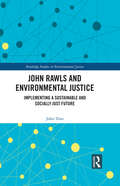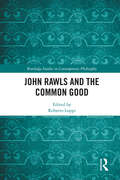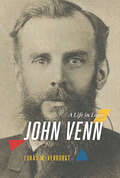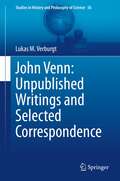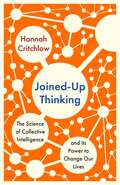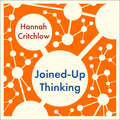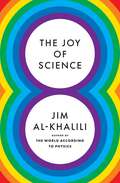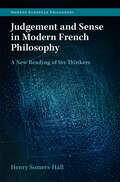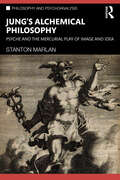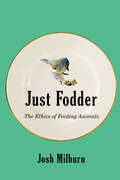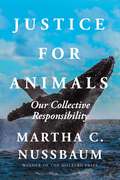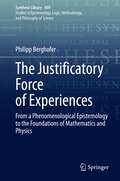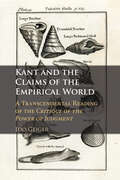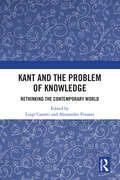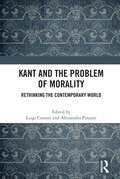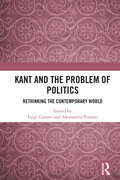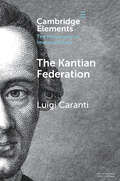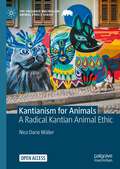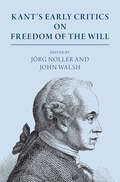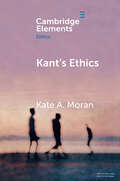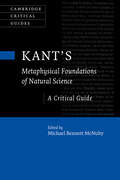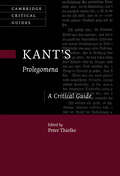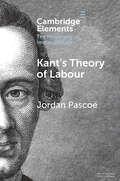- Table View
- List View
John Rawls and Environmental Justice: Implementing a Sustainable and Socially Just Future (Routledge Studies in Environmental Justice)
by John TönsUsing the principles of John Rawls’ theory of justice, this book offers an alternative political vision, one which describes a mode of governance that will enable communities to implement a sustainable and socially just future. Rawls described a theory of justice that not only describes the sort of society in which anyone would like to live but that any society can create a society based on just institutions. While philosophers have demonstrated that Rawls’s theory can provide a framework for the discussion of questions of environmental justice, the problem for many philosophical theories is that discussions of sustainable development open the need to address questions of ecological interdependence, historical inequality in past resource use and the recognition that we cannot afford to ignore the limitations of growth. These ideas do not fit in comfortably in standard discourse about theories of justice. In contrast, this book frames the discussion of global justice in terms of environmental sustainability. The author argues that these ideas can be used to develop a coherent political theory that reconciles cosmopolitan arguments and the non-cosmopolitan or nationalist arguments concerning social and environmental justice. This book will be of great interest to students and scholars of environmental philosophy and ethics, moral and political philosophy, global studies and sustainable development.
John Rawls and the Common Good (Routledge Studies in Contemporary Philosophy)
by Roberto LuppiThe essays in this volume analyze the relationship between core concepts of the common good and the work of American political philosopher John Rawls.One of the main criticisms that has been made of Rawls is his supposed neglect of central aspects of collective life. The contributors to this book explore the possibility of a substantive and community-oriented interpretation of Rawls’s thought. The chapters investigate Rawls’s views on values such as community, faith, fraternity, friendship, gender equality, love, political liberty, reciprocity, respect, sense of justice, and virtue. They demonstrate that Rawls finds a balance between certain individualistic aspects of his theory of justice and the value of community. In doing so, the book offers insightful new readings of Rawls.John Rawls and the Common Good will be of interest to scholars and advanced students working in political, moral, and legal philosophy.
John Venn: A Life in Logic (Studies In History And Philosophy Of Science Ser. #56)
by Lukas M. VerburgtThe first comprehensive history of John Venn’s life and work. John Venn (1834–1923) is remembered today as the inventor of the famous Venn diagram. The postmortem fame of the diagram has until now eclipsed Venn’s own status as one of the most accomplished logicians of his day. Praised by John Stuart Mill as a “highly successful thinker” with much “power of original thought,” Venn had a profound influence on nineteenth-century scientists and philosophers, ranging from Mill and Francis Galton to Lewis Carroll and Charles Sanders Peirce. Venn was heir to a clerical Evangelical dynasty, but religious doubts led him to resign Holy Orders and instead focus on an academic career. He wrote influential textbooks on probability theory and logic, became a fellow of the Royal Society, and advocated alongside Henry Sidgwick for educational reform, including that of women’s higher education. Moreover, through his students, a direct line can be traced from Venn to the early analytic philosophy of G. E. Moore and Bertrand Russell, and family ties connect him to the famous Bloomsbury group. This essential book takes readers on Venn’s journey from Evangelical son to Cambridge don to explore his life and work in context. Drawing on Venn’s key writings and correspondence, published and unpublished, Lukas M. Verburgt unearths the legacy of the logician’s wide-ranging thinking while offering perspective on broader themes in religion, science, and the university in Victorian Britain. The rich picture that emerges of Venn, the person, is of a man with many sympathies—sometimes mutually reinforcing and at other times outwardly and inwardly contradictory.
John Venn: A Life in Logic (Studies In History And Philosophy Of Science Ser. #56)
by Lukas M. VerburgtThe first comprehensive history of John Venn’s life and work. John Venn (1834–1923) is remembered today as the inventor of the famous Venn diagram. The postmortem fame of the diagram has until now eclipsed Venn’s own status as one of the most accomplished logicians of his day. Praised by John Stuart Mill as a “highly successful thinker” with much “power of original thought,” Venn had a profound influence on nineteenth-century scientists and philosophers, ranging from Mill and Francis Galton to Lewis Carroll and Charles Sanders Peirce. Venn was heir to a clerical Evangelical dynasty, but religious doubts led him to resign Holy Orders and instead focus on an academic career. He wrote influential textbooks on probability theory and logic, became a fellow of the Royal Society, and advocated alongside Henry Sidgwick for educational reform, including that of women’s higher education. Moreover, through his students, a direct line can be traced from Venn to the early analytic philosophy of G. E. Moore and Bertrand Russell, and family ties connect him to the famous Bloomsbury group. This essential book takes readers on Venn’s journey from Evangelical son to Cambridge don to explore his life and work in context. Drawing on Venn’s key writings and correspondence, published and unpublished, Lukas M. Verburgt unearths the legacy of the logician’s wide-ranging thinking while offering perspective on broader themes in religion, science, and the university in Victorian Britain. The rich picture that emerges of Venn, the person, is of a man with many sympathies—sometimes mutually reinforcing and at other times outwardly and inwardly contradictory.
John Venn: Unpublished Writings and Selected Correspondence (Studies in History and Philosophy of Science #56)
by Lukas M. VerburgtThis is the first book to present a carefully chosen and annotated selection of the unpublished writings and correspondence of the English logician John Venn (1834-1923). Today remembered mainly as the inventor of the famous diagram that bears his name, Venn was an important figure of nineteenth-century Cambridge, where he worked alongside leading thinkers, such as Henry Sidgwick and Alfred Marshall, on the development of the Moral Sciences Tripos. Venn published three influential textbooks on logic, contributed some dozen articles to the then newly-established journal Mind, of which he became co-editor in 1892, and counted F.W. Maitland, William Cunningham and Arthur Balfour among his pupils. After his active career as a logician, which ended around the turn of the 20th century, Venn reinvented himself as a biographer of his University, College and family. Together with his son, he worked on the massive Alumni Cantabrigienses, which is still used today as a standard reference source. The material presented here, including the 100-page Annals: Autobiographical Sketch, provides much new information on Venn's philosophical development and Cambridge in the 1850s-60s. It also brings to light Venn's relation with famous colleagues and friends, such as Leslie Stephen, Francis Galton, and William Stanley Jevons, thereby placing him at the heart of Victorian intellectual life.
Joined-Up Thinking: The Science of Collective Intelligence and its Power to Change Our Lives
by Hannah Critchlow'A lively examination of communal endeavour... important and correct' - Steven Poole, The GuardianAt a time of existential global challenges, we need our best brainpower to solve them.So how do we create genius environments, help our brains flourish and boost group thinking?Neuroscientist and bestselling author of The Science of Fate Hannah Critchlow shows how two heads can be better than one. Almost everything we've ever achieved has been done by groups working together, sometimes across time and space. Like a hive of bees, or a flock of birds, our naturally social, interconnected brains are designed to function best collectively.New technology is helping us share our wisdom and knowledge much more diversely across race, class, gender and borders. And AI is sparking a revolution in our approach to intelligent thinking - linking us into fast-working brain-nets for problem solving.Hannah Critchlow shows all the tricks to help us work best collectively - how to cope with wildly differing opinions, balance our biases, prevent a corrupting force, and exercise our intuitive ability for the most effective outcomes. She shares compelling examples of success, at work, in families, and all team situations, and shows us how to work, play and grow with intelligence.
Joined-Up Thinking: The Science of Collective Intelligence and its Power to Change Our Lives
by Hannah CritchlowSunday Times top ten bestselling author of The Science of Fate neuroscientist Hannah Critchlow brilliantly illuminates the new science of collective intelligence, showing how it can work to improve our lives and help solve the huge global challenges confronting us.At a time of existential global challenges we need our best brainpower to solve them. We can no longer rely on the myth of the lone genius to create a breakthrough.As neuroscientist and bestselling author of The Science of Fate Hannah Critchlow shows, two heads have always been better than one. Almost everything we've ever achieved has been done by groups of people working together, sometimes across time and space. Like a hive of bees, or a flock of birds, our naturally social, interconnected brains are designed to function best collectively.New technology is helping us share our wisdom and knowledge much more diversely across race, class, gender and borders. And AI is sparking a revolution in our approach to intelligent thinking -linking us into fast-working brainnets for problem solving.Hannah Critchlow brings us an enlightening, invaluable guide to our future through the evolving new science of collective intelligence. She reveals what it says about us as human beings, shares compelling examples and stories, and shows us how best we can work collectively at work, in families, in any team situation to improve our outcomes, our wellbeing, and our prospects. (P) 2022 Hodder & Stoughton Limited
The Joy of Science
by Jim Al-KhaliliQuantum physicist, New York Times bestselling author, and BBC host Jim Al-Khalili reveals how 8 lessons from the heart of science can help you get the most out of lifeToday’s world is unpredictable and full of contradictions, and navigating its complexities while trying to make the best decisions is far from easy. The Joy of Science presents 8 short lessons on how to unlock the clarity, empowerment, and joy of thinking and living a little more scientifically.In this brief guide to leading a more rational life, acclaimed physicist Jim Al-Khalili invites readers to engage with the world as scientists have been trained to do. The scientific method has served humankind well in its quest to see things as they really are, and underpinning the scientific method are core principles that can help us all navigate modern life more confidently. Discussing the nature of truth and uncertainty, the role of doubt, the pros and cons of simplification, the value of guarding against bias, the importance of evidence-based thinking, and more, Al-Khalili shows how the powerful ideas at the heart of the scientific method are deeply relevant to the complicated times we live in and the difficult choices we make.Read this book and discover the joy of science. It will empower you to think more objectively, see through the fog of your own preexisting beliefs, and lead a more fulfilling life.
Judgement and Sense in Modern French Philosophy: A New Reading of Six Thinkers (Modern European Philosophy)
by Henry Somers-HallThis book proposes a radical new reading of the development of twentieth-century French philosophy. Henry Somers-Hall argues that the central unifying aspect of works by philosophers including Sartre, Foucault, Merleau-Ponty, Deleuze and Derrida is their attempt to provide an account of cognition that does not reduce thinking to judgement. Somers-Hall shows that each of these philosophers is in dialogue with the others in a shared project (however differently executed) to overcome their inheritances from the Kantian and post-Kantian traditions. His analysis points up the continuing relevance of German idealism, and Kant in particular, to modern French philosophy, with novel readings of many aspects of the philosophies under consideration that show their deep debts to Kantian thought. The result is an important account of the emergence, and essential coherence, of the modern French philosophical tradition.
Jung’s Alchemical Philosophy: Psyche and the Mercurial Play of Image and Idea (Philosophy and Psychoanalysis)
by Stanton MarlanTraditionally, alchemy has been understood as a precursor to the science of chemistry but from the vantage point of the human spirit, it is also a discipline that illuminates the human soul. This book explores the goal of alchemy from Jungian, psychological, and philosophical perspectives. Jung’s Alchemical Philosophy: Psyche and the Mercurial Play of Image and Idea is a reflection on Jung’s alchemical work and the importance of philosophy as a way of understanding alchemy and its contributions to Jung’s psychology. By engaging these disciplines, Marlan opens new vistas on alchemy and the circular and ouroboric play of images and ideas, shedding light on the alchemical opus and the transformative processes of Jungian psychology. Divides in the history of alchemy and in the alchemical imagination are addressed as Marlan deepens the process by turning to a number of interpretations that illuminate both the enigma of the Philosophers’ Stone and the ferment in the Jungian tradition. This book will be of interest to Jungian analysts and those who wish to explore the intersection of philosophy and psychology as it relates to alchemy.
Just Fodder: The Ethics of Feeding Animals
by Josh MilburnAnimal lovers who feed meat to other animals are faced with a paradox: perhaps fewer animals would be harmed if they stopped feeding the ones they love. Animal diets do not raise problems merely for individuals. To address environmental crises, health threats, and harm to animals, we must change our food systems and practices. And in these systems, animals, too, are eaters.Moving beyond what humans should eat and whether to count animals as food, Just Fodder answers ethical and political questions arising from thinking about animals as eaters. Josh Milburn begins with practical dilemmas about feeding the animals closest to us, our pets or animal companions. The questions grow more complicated as he considers relationships with more distance – questions about whether and how to feed garden birds, farmland animals who would eat our crops, and wild animals. Milburn evaluates the nature and circumstances of our relationships with animals to generate a novel theory of animal rights.Looking past arguments about what we can and cannot do to other beings, Just Fodder asks what we can, should, and must do for them, laying out a fuller range of our ethical obligations to other animals.
Justice for Animals: Our Collective Responsibility
by Martha C. NussbaumA revolutionary new theory and call to action on animal rights, ethics, and law from the renowned philosopher Martha C. Nussbaum.Animals are in trouble all over the world. Whether through the cruelties of the factory meat industry, poaching and game hunting, habitat destruction, or neglect of the companion animals that people purport to love, animals suffer injustice and horrors at our hands every day. The world needs an ethical awakening, a consciousness-raising movement of international proportions. In Justice for Animals, one of the world&’s most influential philosophers and humanists Martha C. Nussbaum provides a revolutionary approach to animal rights, ethics, and law. From dolphins to crows, elephants to octopuses, Nussbaum examines the entire animal kingdom, showcasing the lives of animals with wonder, awe, and compassion to understand how we can create a world in which human beings are truly friends of animals, not exploiters or users. All animals should have a shot at flourishing in their own way. Humans have a collective duty to face and solve animal harm. An urgent call to action and a manual for change, Nussbaum&’s groundbreaking theory directs politics and law to help us meet our ethical responsibilities as no book has done before.
The Justificatory Force of Experiences: From a Phenomenological Epistemology to the Foundations of Mathematics and Physics (Synthese Library #459)
by Philipp BerghoferThis book offers a phenomenological conception of experiential justification that seeks to clarify why certain experiences are a source of immediate justification and what role experiences play in gaining (scientific) knowledge. Based on the author's account of experiential justification, this book exemplifies how a phenomenological experience-first epistemology can epistemically ground the individual sciences. More precisely, it delivers a comprehensive picture of how we get from epistemology to the foundations of mathematics and physics.The book is unique as it utilizes methods and insights from the phenomenological tradition in order to make progress in current analytic epistemology. It serves as a starting point for re-evaluating the relevance of Husserlian phenomenology to current analytic epistemology and making an important step towards paving the way for future mutually beneficial discussions. This is achieved by exemplifying how current debates can benefit from ideas, insights, and methods we find in the phenomenological tradition.
Kant and the Claims of the Empirical World: A Transcendental Reading of the Critique of the Power of Judgment
by Ido GeigerKant announces that the Critique of the Power of Judgment will bring his entire critical enterprise to an end. But it is by no means agreed upon that it in fact does so and, if it does, how. In this book, Ido Geiger argues that a principal concern of the third Critique is completing the account of the transcendental conditions of empirical experience and knowledge. This includes both Kant's analysis of natural beauty and his discussion of teleological judgments of organisms and of nature generally. Geiger's original reading of the third Critique shows that it forms a unified whole - and that it does in fact deliver the final part of Kant's transcendental undertaking. His book will be valuable to all who are interested in Kant's theory of the aesthetic and conceptual purposiveness of nature.
Kant and the French Revolution (Elements in the Philosophy of Immanuel Kant)
by Reidar MaliksTo Kant, the French revolution's central events were the transfer of sovereignty to the people in 1789 and the trial and execution of the monarch in 1792-1793. Through a contextual study, this Element argues that while both events manifested the principle of popular sovereignty, the first did so in lawful ways, whereas the latter was a perversion of the principle. Kant was convinced that historical examples can help us understand political philosophy, and this Element seeks to show this in practice.
Kant and the Problem of Knowledge: Rethinking the Contemporary World
by Luigi Caranti Alessandro PinzaniThis book examines Kant’s contributions to the theory of knowledge and studies how his writings can be applied to address contemporary epistemological issues. The volume delves into the Kantian ideas of transcendental idealism, space, naturalism, epistemic normativity, communication, and systematic unity. The essays in the volume study Kant’s theories from a fresh perspective and offer new arguments for assenting that knowledge cannot account for itself without acknowledging the fundamental role of the cognitive subject. In doing so, they suggest that we reconsider Kant’s views as a powerful alternative to naturalism. Featuring readings by well-known Kant specialists and emerging scholars with unorthodox approaches to Kant’s philosophy, the volume fills a significant gap in the existing scholarship on the philosopher and his works. It will be of great interest to scholars and researchers of knowledge, philosophy, and epistemology.
Kant and the Problem of Morality: Rethinking the Contemporary World
by Luigi Caranti Alessandro PinzaniThis book examines the significance of Kant’s moral philosophy in contemporary philosophical debates. It argues that Kant’s philosophy can still serve as a guide to navigate the turbulence of a globalized world in which we are faced by an imprescriptible social reality wherein moral values and ethical life models are becoming increasingly unstable. The volume draws on Kantian ethics to discuss various contemporary issues, including sustainable development, moral enhancement, sexism, and racism. It also tackles general concepts of practical philosophy such as lying, the different kinds of moral duties, and the kind of motivation one needs for doing what we consider the right thing. Featuring readings by well-known Kant specialists and emerging scholars with unorthodox approaches to Kant’s philosophy, the volume will be of great interest to scholars and researchers of philosophy, politics and ethics. It will also appeal to moral theorists, applied ethicists and environmental theorists.
Kant and the Problem of Politics: Rethinking the Contemporary World
by Luigi Caranti Alessandro PinzaniThis book examines the significance of Kant’s political philosophy in the context of contemporary philosophical and political debates. In the last few decades, Kantian specialists have increasingly manifested a purely exegetic and philological interest in Kant’s oeuvre, while contemporary philosophers and scientists tend to use Kant with scant hermeneutical care, thus misrepresenting or misunderstanding his positions. This volume countervails these tendencies by focusing more on specific themes of contemporary relevance in Kant’s writings. It looks to Kant’s political thought for insight on tackling issues such as freedom of speech, democracy and populism, intergenerational justice, economic inequality, money, poverty, international justice, and gender/feminism. Featuring readings by well-known Kant specialists and emerging scholars with unorthodox approaches to Kant’s philosophy, the volume fills a significant gap in the existing scholarship on the philosopher and his works. It will be of great interest to scholars and researchers of philosophy, politics, and ethics.
The Kantian Federation (Elements in the Philosophy of Immanuel Kant)
by Luigi CarantiThis Element introduces the reader to Kant's theory of peace and to its place in the broader context of the critical philosophy. It also delves into one aspect of the model that has generated much debate among interpreters, given Kant's changing thoughts on the matter. This aspect relates to the nature and powers of the international federation. Defending the idea that national sovereignty is indissolubly linked to states' full autonomy regarding the use of military power, this Element offers an interpretation and defense of the Kantian federation that, in many regards, departs from the mainstream reading. Special emphasis is placed on the problematic coexistence of two conflicting theoretical desiderata: on the one hand, the necessity of establishing an international institution with coercive powers for securing peace; on the other hand, the necessity of avoiding the risk of an excessive erosion of states' sovereignty.
Kantianism for Animals: A Radical Kantian Animal Ethic (The Palgrave Macmillan Animal Ethics Series)
by Nico Dario MüllerThis open access book revises Kant’s ethical thought in one of its most notorious respects: its exclusion of animals from moral consideration. The book gives readers in animal ethics an accessible introduction to Kant’s views on our duties to others, and his view that we have only ‘indirect’ duties regarding animals. It then investigates how one would have to depart from Kant in order to recognise that animals matter morally for their own sake. Particular attention is paid to Kant’s ‘Formula of Humanity,' the role of autonomy and the moral law, as well as Kant’s notions of practical reason and animal instinct. The result is a deliberately amended version of Kantianism which nevertheless remains faithful to central aspects of Kant’s thought. The book’s final part illustrates the framework’s use in applied contexts, addressing the issues of using animals as mere means, the ethics of veganism and vegetarianism, and environmental protection. Nico Dario Müller shows how, when furnished with duties to animals, Kant's moral philosophy can be a powerful resource for animal ethicists.
Kant's Early Critics on Freedom of the Will
by Jörg Noller John WalshThis book offers translations of early critical reactions to Kant's account of free will. Spanning the years 1784-1800, the translations make available, for the first time in English, works by little-known thinkers including Pistorius, Ulrich, Heydenreich, Creuzer and others, as well as familiar figures including Reinhold, Fichte and Schelling. Together they are a testimony to the intense debates surrounding the reception of Kant's account of free will in the 1780s and 1790s, and throw into relief the controversies concerning the coherence of Kant's concept of transcendental freedom, the possibility of reconciling freedom with determinism, the relation between free will and moral imputation, and other arguments central to Kant's view. The volume also includes a helpful introduction, a glossary of key terms and biographical details of the critics, and will provide a valuable foundation for further research on free will in post-Kantian philosophy.
Kant's Ethics (Elements in Ethics)
by Kate A. MoranThe Element provides an overview of Immanuel Kant's arguments regarding the content of the moral law (the categorical imperative), as well as an exposition of his arguments for the bindingness of the moral law for rational agents. The Element also considers common objections to Kant's ethics.
Kant's Metaphysical Foundations of Natural Science: A Critical Guide (Cambridge Critical Guides)
by Michael Bennett McNultyIn his Metaphysical Foundations of Natural Science (1786), Kant accounts for the possibility of an acting-at-a-distance gravitational force, demonstrates the infinite divisibility of matter, and derives analogues to Newtonian laws of motion. The work is his major statement in philosophy of science, and was especially influential in German-speaking countries in the nineteenth century. However, this complex text has not received the scholarly attention it deserves. The chapters of this Critical Guide clarify the accounts of matter, motion, the mathematization of nature, space, and natural laws exhibited in the Metaphysical Foundations; elucidate the relationship between its metaphysics of nature and Kant's critical philosophy; and describe the historical context for Kant's account of natural science. The volume will be an invaluable resource for understanding one of Kant's most difficult works, and will set the agenda for future scholarship on Kant's philosophy of science.
Kant's Prolegomena: A Critical Guide (Cambridge Critical Guides)
by Peter ThielkeThe Prolegomena is often dismissed as Kant's failed attempt to popularize his philosophy, but as the essays collected here show, there is much to be gained from a careful study of the work. The essays explore the distinctive features of the Prolegomena, including Kant's discussion of philosophical methodology, his critical idealism, the nature of experience, his engagement with Hume, the nature of the self, the relation between geometry and physics, and what we cognize about God. Newly commissioned for this volume, the essays as a whole offer sophisticated and innovative interpretations of the Prolegomena, and cast Kant's critical philosophy in a new light.
Kant's Theory of Labour (Elements in the Philosophy of Immanuel Kant)
by Jordan PascoeThis Element examines Kant's innovative account of labour in his political philosophy and develops an intersectional analysis of Kant. By demonstrating that Kant's analysis of slavery, citizenship, and sex developed in inter-linked ways over several decades, culminating in his development of a 'trichotomy' of Right, the author shows that Kant's normative account of independence is configured through his theory of labour, and is continuous with his anthropological accounts of race and gender, providing a systemic justification for the dependency of women and non-whites embedded in his philosophy of right. By examining Kant's arguments about slavery as intertwined with his account of domestic labour, the author argues that his ultimate rejection of slavery may owe more to his changing conceptualization of labour than to his theory of race, and that his final arguments against slavery rehearse strategies for embedding intersectional patterns of domestic dependence in his account of the rightful state.
